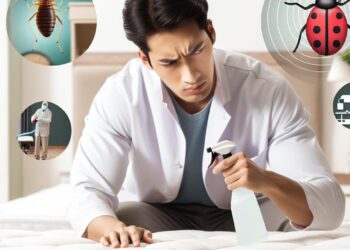Bed bugs are pesky little creatures that no one wants in their home, and if you’re dealing with them, you’re probably on the hunt for a straightforward, effective solution. Enter: DIY tea tree oil spray. This natural remedy has gained popularity thanks to its proven pest-repelling properties without the harsh chemicals found in traditional sprays. Controlling bed bugs with tea tree oil is important because these critters can disrupt your peace, affect your sleep, and even harm your health through allergic reactions. In this blog, we’ll explore the benefits of this spray, discuss common issues, and provide simple solutions to protect your home.
What is DIY Tea Tree Oil Spray for Bed Bugs?
You know, bed bugs – those pesky little creatures that give us sleepless nights? They’re small, oval, and brownish insects that love making homes in our mattresses, bed frames, and even carpets. They aren’t picky about where they settle down, as long as it’s near humans for a regular meal. Bed bugs are notorious for being great hitchhikers too, easily spreading through luggage and clothing. Have you ever noticed itchy welts on your skin or small rust-colored stains on your sheets? Yep, that’s a telltale sign of an infestation. Other indicators include finding their tiny eggshells or shedding skins around your sleeping area. For those looking for a natural approach, a DIY tea tree oil spray for bed bugs could be a lifesaver. It’s an essential oil known for its strong odor and antimicrobial properties, making it quite effective at repelling these stubborn pests. Remember though, while it can help, it’s not a complete solution.Common Pitfalls of DIY Tea Tree Oil Bed Bug Sprays
Sure thing, let’s dive into the potential issues surrounding the use of a DIY tea tree oil spray for bed bugs. While this natural remedy might seem like the perfect homemade solution, there are several common problems you might encounter:- Structural Damage: Using excessive amounts of tea tree oil spray can lead to moisture build-up, especially if sprayed on wooden surfaces or delicate finishes, potentially causing structural harm over time. Be cautious, as unchecked humidity can deteriorate certain materials.
- Health Risks: Tea tree oil, when not diluted adequately, can be a skin irritant or an allergen. Overexposure might lead to respiratory problems or skin irritation for some individuals. It’s essential to handle this oil with care and wear protective gear if necessary.
- Food Contamination: Spraying areas near food preparation or storage can result in contamination. Ingesting even small amounts of essential oils like tea tree can be harmful. Ensure all eatables are stored safely away before applying your spray.
- Property Devaluation: Persistent strong odors from overusing tea tree oil might deter prospective buyers if not ventilated properly. A lingering medicinal smell can be unappealing and decrease your property’s market value.
- Damage to Pets and Gardens: Certain pets, particularly cats, can be sensitive to tea tree oil. They might suffer from adverse reactions if exposed. Additionally, if sprayed inadvertently on garden plants, tea tree oil can interfere with their growth and health.
- Environmental Impact: Tea tree oil and its strong odor can sometimes disrupt local ecosystems. Balance is key to avoiding negative impacts on both your indoor and outdoor environments.
Effective Natural Remedies Using Tea Tree Oil for Bed Bugs
- DIY Tea Tree Oil Spray: Tea tree oil is a fantastic, eco-friendly remedy for tackling bed bugs. Mix a few drops of tea tree oil with water in a spray bottle, then spritz it around bed frames, mattresses, and any crevices where bed bugs hide. Its strong scent is naturally repellent to these pesky bugs and can break down their exoskeleton, making it effective for minor infestations. Plus, it’s non-toxic for humans and pets!
- Lavender Oil: This fragrant oil isn’t just great for relaxation; it’s also a natural bed bug deterrent. Like tea tree oil, you can mix lavender oil with water and spray it in affected areas. The intense smell is unappealing to bed bugs, helping keep them at bay. It’s a win-win—your space smells lovely, and the bugs don’t stand a chance.
- Vinegar Solution: Vinegar can kill bed bugs on contact due to its acidic nature. Fill a spray bottle with white vinegar and spray directly on bed bugs to eliminate them. It’s a straightforward solution for dealing with visible bugs, though not a long-term fix, so use it alongside other methods.
- Boric Acid Traps: Sprinkle boric acid around possible hiding spots like behind furniture and along the baseboards. While not immediately effective in killing bed bugs, it can reduce their numbers by poisoning them when ingested. Be wary, though—while generally safe, it’s best kept away from pets and children.
- Mint Leaves: Scatter fresh mint leaves in areas prone to infestations. Bed bugs dislike the smell, and it can serve as a deterrent. Replace the leaves regularly to maintain their potency. It’s a simple, cost-effective measure to repel bed bugs without using chemicals.
- Clove Oil: Known for its strong scent, clove oil is another essential oil that bed bugs hate. Mix clove oil with a carrier oil and apply it to bed frames and baseboards. Not only does it deter the bugs, but it also acts as a natural sanitizer.
Tea tree oil spray: A natural alternative to chemical treatments.
If you’re exploring chemical treatments as an alternative or alongside a DIY tea tree oil spray for bed bugs, there are some effective options you can consider. Remember, safety first: always follow the instructions on any chemical product you use. Here’s a list of potential picks:- Pyrethroids: These chemicals are synthetic versions of naturally occurring pesticides found in chrysanthemums. They’re widely used because they can work effectively on bed bugs. Spray directly onto bed bug hotspots, like mattress seams and behind headboards, where these pests love to hide.
- Diatomaceous Earth: Though more of a natural option, it deserves mention. It’s a type of sand made from fossilized algae. Sprinkle it in areas where bed bugs travel, as it works by dehydrating them, which can lead to their demise over time.
- Neonicotinoids: These chemicals work by affecting the nervous system of bed bugs and are known to overcome resistance often seen with other pesticides. Apply them to known infestation areas, such as mattress edges and furniture joints, ensuring all surfaces get an even coat.
- Insect Growth Regulators (IGRs): These prevent bed bugs from maturing and reproducing, effectively cutting off the cycle. Use it in conjunction with a contact insecticide for double the trouble for these creepy crawlies, as IGRs work best when applied to bed bugs’ favourite hiding spots.
Effective Tips to Keep Bed Bugs Away with Tea Tree Oil
It’s important to stay on top of potential pest problems before they become absolute nightmares. An effective way to ensure your home stays pest-free is by adopting prevention strategies. Here’s a structured list to guide you through:- Proper Waste Disposal and Cleanliness: Keep your home tidy and dispose of rubbish regularly. Pests like rodents and cockroaches are attracted to leftover food and rubbish bins.
- Sealing Entry Points and Cracks: Regularly inspect your home for cracks and holes that might serve as entry points for pests. Use caulk or other appropriate materials to seal them.
- Using Pest Deterrents: Install screens on windows and doors to prevent pests from entering. Consider using natural deterrents like essential oils or herbs, which can be effective and non-toxic.
- Regular Inspections and Maintenance: Schedule regular inspections for signs of pests. Look for droppings, nest materials, or unusual smells. If needed, consult professional pest control services for a thorough check.
- Garden Maintenance: Keep your garden neat and remove any debris, as these can attract pests. Trim trees and bushes to keep them from touching your house, preventing easy access to pests.
- Proper Food Storage: Store food items in airtight containers to keep them safe from pests. Ensure your pantry is clean and free of crumbs.
- Check for Leaks: Fix any leaks promptly, as moisture can attract pests like termites and mould-producing insects.
- Pet Care: If you have pets, make sure their bowls are clean and food is not left out for too long, as this can attract pests like ants or flies.
Common Myths About Tea Tree Oil Spray for Bed Bugs
| Myth | Fact |
|---|---|
| Tea tree oil spray immediately kills bed bugs. | Tea tree oil can repel bed bugs, but it doesn’t kill them instantly. Consistent application is required. |
| Natural remedies like tea tree oil are as effective as professional pest control. | Professional treatments are generally more effective due to stronger formulations and comprehensive methods. |
| If you can’t smell the tea tree oil, it’s not working. | The oil’s efficacy isn’t determined by its smell; its chemical properties are what repels pests. |
| Tea tree oil spray creates an impenetrable barrier for bed bugs. | While it can deter bed bugs, it doesn’t form a permanent barrier, requiring frequent reapplication. |
| Using more tea tree oil in the spray makes it more effective. | Excessive use can be harmful to humans and pets; always follow safe concentration guidelines. |
















